Goering: Czechoslovakia
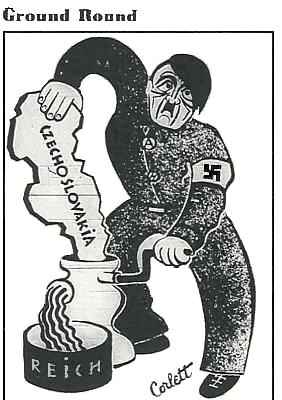
Dr Stahmer: On the 15 March 1939 a conversation took place between Hitler and President Hacha. Were you present during that conversation? And what was your part in it?
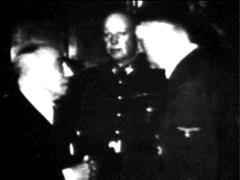
There had been a liaison between Prague and Moscow for a long time. Prague, disappointed by the Munich agreement, could now strengthen its ties with Moscow. Signs of that were seen particularly in the Czech officers' corps and we were informed. And in the event of this proving dangerous to Germany, instructions had been issued to the various military offices to take preventive measures, as was their duty. But that order has nothing to do with any intention of occupying the rest of Czechoslovakia after a short time. I myself went to the Riviera at the end of January for my first long vacation and during that time I dropped all business affairs.

I sent a letter back by courier. Maybe it is among the many tons of documents in the possession of the Prosecution. I could also understand if they do not submit it, for it would be a document of an extenuating character as far as I am concerned. In this letter I communicated these views to the Fuehrer and wrote to him somewhat as follows: That if this were to take place now, it would be a very serious loss of prestige for the British Prime Minister, Chamberlain, and I hardly believed that he would survive it. Then probably Mr. Churchill would come in, and the Fuehrer knew Churchill's attitude toward Germany. Secondly, it would not be understood, since just a short time previously we had settled these things to general satisfaction. Thirdly, I thought I could calm him by telling him the following: I believed that what he wanted to eliminate at the moment in the way of danger, by the occupation of Czechoslovakia, could be achieved in a somewhat lengthier manner, at the same time avoiding anything which might excite Czechoslovakia as well as other countries.
I was convinced that since the Sudetenland had been separated and Austria was a part of Germany an economic penetration of Czechoslovakia would be only a matter of time. That is to say, I hoped by strong economic ties to reach a communications, customs, and currency union, which would serve the economic interests of both countries. If this took place, then a sovereign Czechoslovakia would be politically so closely bound to Germany and German interests that I did not believe that any danger could arise again.

Dr Stahmer: Will you continue, please?
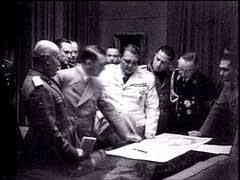


Goering: No, I did not accompany him to Prague. I was rather annoyed. I did not enter Czechoslovakia or Sudeten Germany at any time after that incident, with the exception of 21 April 1945 when I passed through a part of Czechoslovakia.
Dr Stahmer: Why were you annoyed?
Goering: Because the whole matter had been carried out more or less over my head.
Dr Stahmer: Did other powers take a part in the occupation of Czechoslovakia?
Goering: Yes. Poland took the Olsa territory at that time.
Dr Stahmer: The Prosecution have presented a document from which the conclusion is drawn that the murder of the German Ambassador was to take place in connection with anti-German demonstrations in Prague. It has been interpreted as if this assassination of the German Ambassador were to be carried out in order to provide a motive for the annexation.
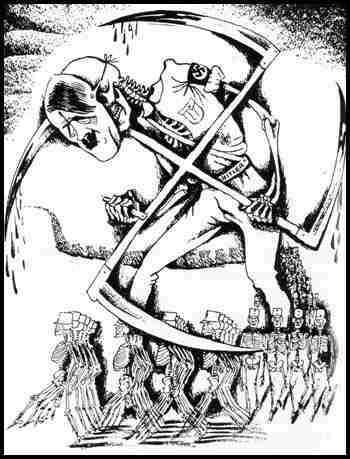
Dr Stahmer: To what extent were confiscationís carried out in Czechoslovakia?


Furthermore, it is obvious that as Sudetenland was included in the Reich, the accusation that state property and forests were taken over into German State possession has no bearing; for naturally if a country is taken over, then its state property must also become the property of the new state. Likewise the accusation, as far as Sudetenland is concerned, that the banks there were affiliated with German banks is obviously not justified, as German currency was introduced for the country, and therefore the branch banks also had to be converted to that.

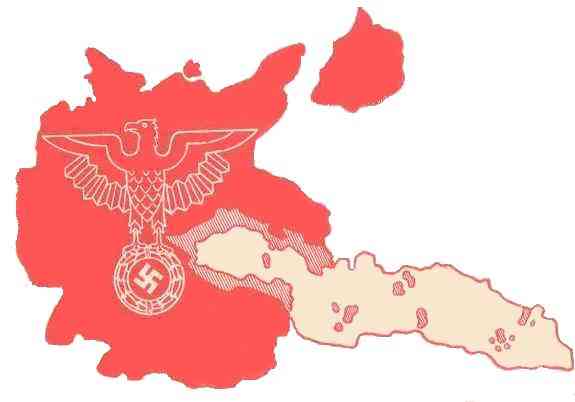





The Nuremberg Tribunal Biographies
Caution: As always, these excerpts from trial testimony should not necessarily be mistaken for fact. It should be kept in mind that they are the sometimes-desperate statements of hard-pressed defendants seeking to avoid culpability and shift responsibility from charges that, should they be found guilty, can possibly be punishable by death.
Disclaimer:The Propagander!™ includes diverse and controversial materials--such as excerpts from the writings of racists and anti-Semites--so that its readers can learn the nature and extent of hate and anti-Semitic discourse. It is our sincere belief that only the informed citizen can prevail over the ignorance of Racialist "thought." Far from approving these writings, The Propagander!™ condemns racism in all of its forms and manifestations.
Source Note: The trial portion of this material, which is available in its entirety at the outstanding Avalon and Nizkor sites, is being presented here in a catagorized form for ease of study and is not meant to supplant or replace these highly recommended sources.
Fair Use Notice: This site may contain copyrighted material the use of which has not always been specifically authorized by the copyright owner. We are making such material available in our efforts to advance understanding of historical, political, human rights, economic, democracy, scientific, environmental, and social justice issues, etc. We believe this constitutes a "fair use" of any such copyrighted material as provided for in section 107 of the US Copyright Law. In accordance with Title 17 U.S.C. Section 107, the material on this site is distributed without profit to those who have expressed a prior interest in receiving the included information for research and educational purposes. If you wish to use copyrighted material from this site for purposes of your own that go beyond 'fair use', you must obtain permission from the copyright owner.

